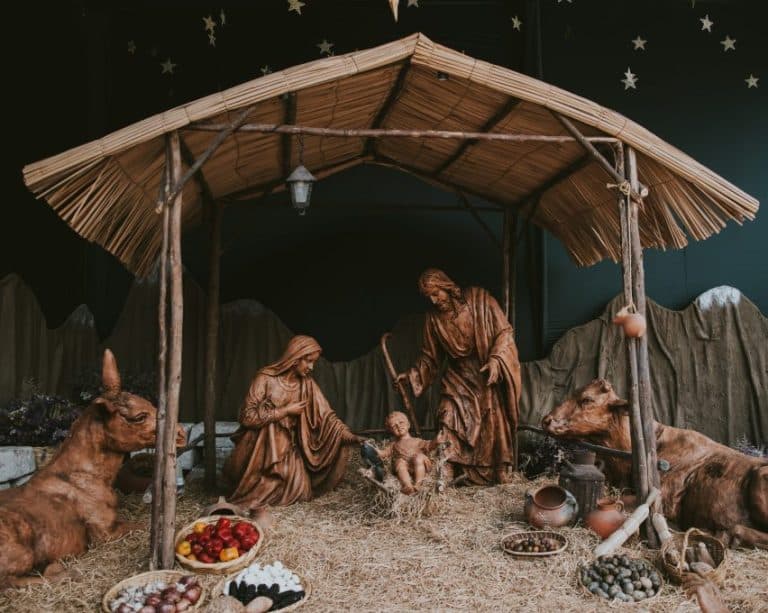Opening Hymn: 207 It Came upon the Midnight Clear or 214 I Heard the Bells on Christmas Day
This Sunday is the Second Sunday of Advent. People in churches that worship following a Lectionary, a calendar of scriptures, will hear the message of Isaiah:
Isaiah 40:1-11
1 Comfort, O comfort my people, says your God.
2 Speak tenderly to Jerusalem, and cry to her that she has served her term, that her penalty is paid, that she has received from the Lord’s hand double for all her sins.
3 A voice cries out: “In the wilderness prepare the way of the LORD, make straight in the desert a highway for our God.
4 Every valley shall be lifted up, and every mountain and hill be made low; the uneven ground shall become level, and the rough places a plain.
5 Then the glory of the LORD shall be revealed, and all people shall see it together, for the mouth of the LORD has spoken.”
6 A voice says, “Cry out!” And I said, “What shall I cry?” All people are grass, their constancy is like the flower of the field.
7 The grass withers, the flower fades, when the breath of the LORD blows upon it; surely the people are grass.
8 The grass withers, the flower fades; but the word of our God will stand forever.
9 Get you up to a high mountain, O Zion, herald of good tidings; lift up your voice with strength, O Jerusalem, herald of good tidings, lift it up, do not fear; say to the cities of Judah, “Here is your God!”
10 See, the Lord GOD comes with might, and his arm rules for him; his reward is with him, and his recompense before him.
11 He will feed his flock like a shepherd; he will gather the lambs in his arms, and carry them in his bosom, and gently lead the mother sheep.
What stands out to you in these verses? What kind of message is this?
Congregations who follow Anglican, Baptist, Episcopal, Lutheran, Methodist, Presbyterian and Catholic precepts – among others – will be today reminded of this letter from Peter:
2 Pet 3:8-15a (this is the NIV version, which I think reads more like the letter from a friend that this is – feel free to use the KJV)
8 But do not forget this one thing, dear friends: With the Lord a day is like a thousand years, and a thousand years are like a day.
9 The Lord is not slow in keeping his promise, as some understand slowness. Instead he is patient with you, not wanting anyone to perish, but everyone to come to repentance.
10 But the day of the Lord will come like a thief. The heavens will disappear with a roar; the elements will be destroyed by fire, and the earth and everything done in it will be laid bare.
11 Since everything will be destroyed in this way, what kind of people ought you to be? You ought to live holy and godly lives
12 as you look forward to the day of God and speed its coming. That day will bring about the destruction of the heavens by fire, and the elements will melt in the heat.
13 But in keeping with his promise we are looking forward to a new heaven and a new earth, where righteousness dwells.
14 So then, dear friends, since you are looking forward to this, make every effort to be found spotless, blameless and at peace with him.
15 Bear in mind that our Lord’s patience means salvation.
For those who don’t know what Advent is, what does it sound like these congregations are looking forward to, when these are the scriptures they study today?
Explain that Advent is a period to look forward to the Second Coming of Christ and anticipate the coming celebration of the birth of the Saviour at the same time.
What do the first Christmas and the Second Coming have in common? Which is easier to celebrate and look forward to?
These are the words of Mary as she looked forward to the possibility of the first Christmas:
Luke 1:46-55
46 And Mary said, My soul doth magnify the Lord,
47 And my spirit hath rejoiced in God my Saviour.
48 For he hath regarded the low estate of his handmaiden: for, behold, from henceforth all generations shall call me blessed.
49 For he that is mighty hath done to me great things; and holy is his name.
50 And his mercy is on them that fear him from generation to generation.
51 He hath shewed strength with his arm; he hath scattered the proud in the imagination of their hearts.
52 He hath put down the mighty from their seats, and exalted them of low degree.
53 He hath filled the hungry with good things; and the rich he hath sent empty away.
54 He hath helped his servant Israel, in remembrance of his mercy;
55 As he spake to our fathers, to Abraham, and to his seed for ever.
What does it sound like Mary is looking forward to here? What kind of life does Mary have? Does she sound worried or scared here about the mighty being put down from their seats?
Did the things she prophesied come to pass in the life of her Son? Or her own life?
We cannot celebrate Christmas without also having mirrored the celebrations of the Second Coming and of Easter. The Saviour’s birth is important because He will come again, this time not as a child. It is important because He atoned for us, and died, and lived again. Our Easter hymns reminds us that He conquered fear and pain and death, and with our Christmas hymns we sing our hope for peace, joy and triumph.
Christmas is a time of rejoicing, of acting as though Christ has already come, and focusing on “peace on earth and mercy mild” and thinking of the kind, gentle sweetness of Mary and Joseph and baby Jesus. The Second Coming makes us think of all the work we have to do to prepare.
But isn’t it a little easier to have goodwill when we’re focussed on the rejoicing part? I think that’s the way we need to approach the atonement. It is about work, it’s difficult and sometimes painful and almost always slow, but it’s also already something to celebrate. Jesus has already atoned for our sins, has already experienced everything that we will suffer. The work is in accepting that, not in getting ourselves to a place where we’re good enough that Jesus will offer it. We are already good enough for the atonement to reach us.
President Gordon B Hinckley, the prophet of my youth, said: “I sense in a measure the meaning of His Atonement. I cannot comprehend it all. It is so vast in its reach and yet so intimate in its effect that it defies comprehension.”
It is hard to teach about this, because it is hard to learn about this. Can you share a time when you grasped the magnitude of the atonement, on the vast or intimate levels?
Laura Ingalls Wilder said: “We are better throughout the year for having, in spirit, become a child again at Christmas-time.”
I think something about Christmas connects us to an eternal childhood, in which it is easier to remember that many of the unkind things children do are unintended consequences, and realise that we ourselves, though we all sin basically all the time, do not intend or want to be sinful. We are not inherently wicked, that is a condition of the Natural Man and Woman.
Are we gentler, more forgiving with children than ourselves? How about with someone just a few years younger? How can we extend the same forgiveness to ourselves?
At the same time, I recognise that we do sin pretty much constantly. It is not easy for me to hear the promises that Jesus will fill the hungry with good things and send the rich empty away without wondering which side I am on. The thing about humanity is that we are all both, rich and hungry. We are not like Jesus, born part-human and part-God. We will fail and hurt others and turn away from our Heavenly Parents over and over. Our job on earth is not to stop being human. We cannot become perfect by denying that part of ourselves. We can only become perfect by connecting with God and our Saviour, through accepting the atonement.
I find it so hard to express the totality of the atonement. I turn to this quote from Lighten Up by Chieko Okazaki when I need to better grasp its depth and individuality:
“Well, my dear sisters, the gospel is the good news that can free us from guilt. We know that Jesus experienced the totality of mortal existence in Gethsemane. It’s our faith that He experienced everything- absolutely everything. Sometimes we don’t think through the implications of that belief. We talk in great generalities about the sins of all humankind, about the suffering of the entire human family. But we don’t experience pain in generalities. We experience it individually. That means He knows what it felt like when your mother died of cancer- how it was for your mother, how it still is for you. He knows what it felt like to lose the student body election. He knows that moment when the brakes locked and the car started to skid. He experienced the slave ship sailing from Ghana toward Virginia. He experienced the gas chambers at Dachau. He experienced Napalm in Vietnam. He knows about drug addiction and alcoholism.
Let me go further. There is nothing you have experienced as a woman that He does not also know and recognize. On a profound level, He understands the hunger to hold your baby that sustains you through pregnancy. He understands both the physical pain of giving birth and the immense joy. He knows about PMS and cramps and menopause. He understands about rape and infertility and abortion. His last recorded words to his disciples were, “And, lo, I am with you always, even unto the end of the world.” (Matthew 28:20) He understands your mother-pain when your five-year-old leaves for kindergarten, when a bully picks on your fifth-grader, when your daughter calls to say that the new baby has Down syndrome. He knows your mother-rage when a trusted babysitter sexually abuses your two-year-old, when someone gives your thirteen-year-old drugs, when someone seduces your seventeen-year-old. He knows the pain you live with when you come home to a quiet apartment where the only children are visitors, when you hear that your former husband and his new wife were sealed in the temple last week, when your fiftieth wedding anniversary rolls around and your husband has been dead for two years. He knows all that. He’s been there. He’s been lower than all that. He’s not waiting for us to be perfect. Perfect people don’t need a Savior. He came to save his people in their imperfections. He is the Lord of the living, and the living make mistakes. He’s not embarrassed by us, angry at us, or shocked. He wants us in our brokenness, in our unhappiness, in our guilt and our grief.”
We don’t accept the atonement by denying our sadness, by trying not to make mistakes. We accept the atonement by setting aside our plan to be perfect so that we don’t need to rely on Jesus, and listening to the still small voice.
Yes, perhaps that voice is asking you to sit with the discomfort of being a rich person in a world of increasing income inequality, and maybe that voice is whispering that you should make amends for an unkind joke or reminding you that when you were grumpy with that child it wasn’t really their fault. The still small voice does ask things of us, and sometimes hard things.
But this is important: Jesus doesn’t want us to feel bad and guilty and pained. Those hard things are all for our growth, and can coexist with peace in our human frailty, and a love of ourselves as the Saviour sees us. When He prayed in Gethsemane, He was not filled with resentment, but with love. He does not ask us to feel shame but to turn to each other.
When have you felt that you saw yourself as God or Jesus sees you?
Our job is not to avoid needing help from Jesus, our job is to become like Him — He who felt the pain and suffering and loss that every one of us has ever felt or will ever feel. Our job is to develop empathy, perhaps enough to commune with the divine for a little while longer today than yesterday, maybe enough to ease the burdens of our families and communities and nations.
Our job is to learn to love as He loves, as our Heavenly Parents love: with a love that gives all and holds back nothing, a love that includes ourselves and recognises the great worth of our own soul, and a love that expands to all the world until there is no-one hungry among us.
This Christmas, let us be kind to ourselves as we remember the small and vulnerable way that Jesus came to earth, and let us walk away from power and might and instead seek out the hungry to feed them, so that we may make Him feel at home when He returns.
Closing Hymn: 205 Once in Royal David’s City or 208 Hark! The Herald Angels Sing
This lesson was originally published as Relief Society Lesson 24: The Atonement of Jesus Christ: Vast in Its Reach, Intimate in Its Effect on December 9, 2017.
Note from author: I miss Relief Society (perhaps in 6 months I’ll know enough German for it to be worth attending), and I miss teaching, so this is the lesson I would give if I were teaching this lesson this week. Please take the parts that are useful to you, if you are teaching this lesson on another week.






5 Responses
Thank you for this wonderful lesson! I loved the quote by Sister Okazaki about how Christ experiences all pains – including the ones we think of as female-specific. Thank you for sharing.
You’re so welcome – I’m glad to have this community to share with
Thanks for this. I especially love your use of the lectionary. And that long quote from Chieko Okazaki never gets old.
It is long, but it’s so wonderful, and it does get to something true and deep and important that I think we don’t talk about enough.
I manage not to share it every lesson, but when I do, I can’t shorten it by a word.
And, Jason K., your lectionary posts are part of what drew me into the Bloggenacle 🙂 I’m glad to have something to share in return.
And now someone will read what you write and enter the conversation. Isn’t that a lovely thought?